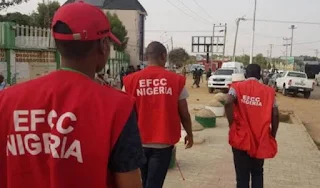The Economic and Financial Crimes Commission (EFCC) has arrested the recently sacked Managing Directors and several top officials of the Port Harcourt Refining Company, Warri Refining and Petrochemical Company, and Kaduna Refining and Petrochemical Company, over the alleged mismanagement of nearly $3 billion allocated for the rehabilitation of the state-owned refineries.
According to credible sources, the EFCC is currently investigating the sum of $2,956,872,622.36, which includes $1.56 billion for the Port Harcourt Refinery, $740 million for Kaduna Refinery, and $656 million for the Warri Refinery.
Among those arrested are Mr. Ibrahim Onoja, former MD of the Port Harcourt Refining Company, and Efifia Chu, former MD of the Warri Refining and Petrochemical Company. A staggering N80 billion was reportedly discovered in the personal accounts of one of the sacked MDs.
Sources at the Nigerian National Petroleum Company Limited (NNPCL) disclosed that the arrests are part of a broader investigation by the EFCC into the whereabouts of funds meant to revive Nigeria’s ailing refinery sector. The probe was initiated following concerns over the actual operational status of the refineries, particularly the Port Harcourt and Warri plants, both of which resumed partial operations in late 2024 but have since failed to meet expectations.
Dashed Hopes of Refinery Revival
Despite the public fanfare, the reality of refinery operations has been disappointing. The Warri Refinery, which reportedly resumed activities in December 2024, was shut down less than a month later due to safety concerns. Similarly, the Port Harcourt Refinery, which recommenced operations in November 2024, has been operating at less than 40% of its installed capacity, raising further questions about the actual progress of the $1.5 billion rehabilitation project.
The newly-appointed management of NNPCL dismissed the managing directors of all three refineries, alongside other senior officials including Bala Wunti, the former head of the National Petroleum Investment Management Services (NAPIMS). Several others nearing retirement were asked to exit the company.
Ongoing Arrests and Investigations
A senior EFCC official confirmed to journalists that the arrests were part of a detailed probe aimed at uncovering what happened to the billions allocated to the refineries. The official stated, “All the principal officers within that time frame are being invited. Some have been arrested already, and we are still on the lookout for others.”
It was further revealed that N80 billion had already been discovered in multiple accounts linked to one of the arrested ex-MDs. “This could be bigger than the Emefiele case,” another source remarked.
Kyari and Other Senior Executives Under EFCC Probe
A document dated April 28, 2025, and obtained from the NNPCL indicates that the EFCC’s investigation has extended to former Group Chief Executive Officer Mele Kyari and 13 other top executives. The letter, titled “Investigation Activities: Request for Information”, requested certified records of emoluments and allowances for the listed individuals, some of whom have retired.
Those named include Abubakar Yar’Adua, Isiaka Abdulrazak, Umar Ajiya, Dikko Ahmed, Ademoye Jelili, Mustapha Sugungun, Kayode Adetokunbo, Efiok Akpan, Babatunde Bakare, Jimoh Olasunkanmi, Bello Kankaya, and Desmond Inyama.
Efforts to get a response from NNPCL spokesperson Olufemi Soneye were unsuccessful, as he reportedly ignored multiple inquiries on the issue.
Public Distrust and Exposed Lies
Despite repeated announcements from the NNPCL regarding refinery rehabilitation and capacity expansion, the actual situation on ground remains grim. The $897 million Warri Refinery reportedly shut down on January 25, 2025, due to safety issues related to the Crude Distillation Unit Main Heater, according to the Nigerian Midstream and Downstream Petroleum Regulatory Authority (NMDPRA).
The Port Harcourt Refinery, despite claims by NNPCL of operating at 70% capacity, has been shown in new documents to be functioning at just 42.23% of its capacity. Independent visits revealed little to no activity on the ground, contradicting official statements.
Energy expert Kelvin Emmanuel, speaking on Arise News, described the televised recommissioning of the refineries as a “charade,” accusing government officials of staging events to deceive Nigerians. He pointed out that the Warri and Port Harcourt refineries lack catalytic reform units necessary to refine naphtha into PMS and that critical infrastructure like the Escravos-Warri pipeline is out of service.
Strike Looms at Warri Refinery
In a related development, support staff at the Warri Refinery are threatening an indefinite strike beginning May 5, 2025, over poor remuneration, lack of benefits, and casualisation. The strike could delay planned efforts to restart the Crude and Vacuum Distillation Units (CDU and VDU), further stalling refinery output.
Staff representative Dafe Ighomitedo said the workers have been protesting since 2015 and had called off an earlier strike in 2022 based on unfulfilled promises.
Marketers and Retailers React
The Independent Petroleum Marketers Association of Nigeria (IPMAN), Delta State chapter, expressed concern over the failure of the Warri Refinery to produce fuel since its rehabilitation. Chairman Harry Okenini lamented that marketers have had to rely on private depots, leading to increased operational costs and price volatility.
Similarly, the Petroleum Products Retail Outlet Owners Association of Nigeria (PETROAN) has called for a thorough investigation into the actual state of the refineries. National President Billy Gillis-Harry defended earlier assessments by PETROAN, stating that their technical team had confirmed the potential for the refineries to function.
The unfolding scandal has dealt a serious blow to the Nigerian government’s promises to revive its domestic refining capacity. With nearly $3 billion unaccounted for, widespread arrests, and fresh revelations of systemic deception, the NNPCL and its leadership now face public outrage, legal scrutiny, and calls for radical reform.
The EFCC’s investigation continues, as Nigerians await justice and clarity over the fate of their refineries and the billions allegedly siphoned in the name of maintenance and rehabilitation.

